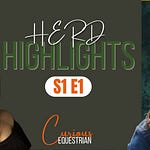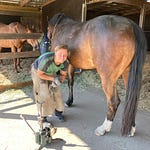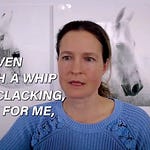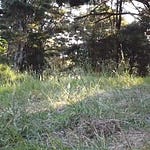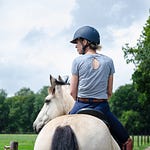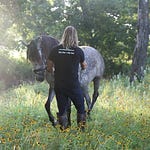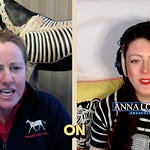How often do you rush to get into the saddle without thinking of the connection with the horse beneath you? For many riders, the focus is on the goal rather than the relationship, a paradigm that Tam and Ants Bennett are challenging through their revolutionary Horse Connection programme in North Devon.
Paid subscribers watch ad-free above, or watch on YouTube free with Ads
A Challenge to Convention: Rethinking the Riding School
"One of the things we say quite clearly up front is that we're not like other riding stables. You won't always be riding," Ants Bennett explained during our recent interview. This statement might seem counterintuitive in an industry where progress is typically measured by time in the saddle, but it represents the core philosophy that's transforming how people interact with horses at their facility.
Tam and Ants took over a 20-year-old British Horse Society riding stables in 2022, but quickly realised that the traditional model wasn't aligned with their vision. "I personally found that the way the animals were being cared for or being worked wasn't really the way I wanted it to be," Tam told us, describing her initial response to the environment they inherited. The horses were fearful, shut down, and in some cases, subjected to troubling training methods.
Instead of continuing business as usual, they made the bold decision to close their doors to customers temporarily, a significant financial risk that ultimately allowed them to reimagine what equestrian education could be.
Learning from Connection: The Bennett Approach
The Bennetts didn't arrive at this perspective without substantial equestrian background. Ants grew up on a farm with horses in Somerset, participating in Pony Club, eventing, and developing a deep bond with his Welsh mountain pony, George, who he credits as formative in his understanding of horse-human relationships.
After pursuing corporate careers in London, the pandemic prompted a reassessment of priorities. In 2022, they acquired their Devon property with the intention of creating holiday lets with "maybe a couple of horses." What they ended up with was significantly larger, eight holiday cottages and a full riding school, but this unexpected scale provided the canvas for their vision.
The foundation of their approach is based on what Ants learned through his qualification in the IFEEL Method of Equine Facilitated Human Development, which he completed in 2024. This methodology combines psychotherapy with horsemanship, creating a framework for safe, meaningful interactions between horses and humans.
"What I found with the equine facilitated work is that I can describe what it is now. So I know the science and I know what is going on for a human and the horse," Ants explained. This evidence-based understanding forms the cornerstone of their programmes.
The Challenges: Confronting Equestrian Expectations
The Bennetts faced significant obstacles in transitioning from a traditional riding school to their connection-focused model. Chief among these was customer expectations.
"People had that expectation to come in, and it might be a strong mom that wants their little Johnny to be able to canter by the end of the week," Ants noted. The pressure to deliver quick riding progress often conflicts with their philosophy of building a foundation through groundwork and connection.
This cultural shift required not just retraining horses, but also reframing human perspectives. They lost some customers in the process, those seeking traditional riding lessons who weren't interested in the deeper work of connection.
Environmental challenges also tested their resolve. The wet climate of North Devon created difficult conditions for maintaining healthy pastures. "It's difficult because it's down to resources sometimes. It's down to what do you have to work with? What do you inherit?" Ants reflected when discussing their ongoing efforts to improve horse living conditions.
Perhaps most fundamentally, they confronted the industry-wide tendency to prioritise goals over relationships. Ants described this as "the balance of goal versus relationship with a horse," explaining that many equestrians become fixated on achieving specific outcomes without establishing the necessary foundation of trust and communication.
Signs of Progress: What to Look For
During our conversation, the Bennetts shared several indicators that signal positive development in both horses and humans engaged in connection-based work:
From shutdown to expressive: "The horses were quite fearful, quite shut down," Tam said of their initial state. Progress is evident when horses become "more playful and interested," showing their unique personalities.
Emerging confidence: For people, particularly children, increased confidence around horses is a key marker. "Children have said they feel more confident when they actually get on the horse," Tam noted.
Energy awareness: A fundamental shift occurs when humans begin recognising and managing their own energy. "Before anybody goes near the horses, we focus on their energy," Ants explained. People learn to observe their internal state and adjust it to create safety for both themselves and the horses.
Present moment engagement: Success is visible when participants move from being "in their heads" to being fully present. As Ants described, "The most important thing for all of us is to get in the present moment." Horses, who naturally live this way, become teachers of this skill.
Character recognition: An intriguing phenomenon they regularly witness is when visitors "gravitate to a horse in the herd" whose characteristics match their own. This mirror effect offers profound self-awareness opportunities.
Transformation Through Connection
The most powerful evidence of their approach comes through the case studies they shared during our interview. One particularly moving example involved a four-year-old girl with developmental delays following infant heart surgery.
"She wasn't speaking. And a week after they'd been staying with us, she was at her home and she just went, 'River,'" Tam recounted. The child had named one of the horses, marking a significant breakthrough in her communication. On a subsequent visit, "she got on the back of Pepper and she rode her like she knew how to ride... she was beaming and she felt confident."
Another remarkable case involved two girls who were selectively mute. "They would speak to their mother, but to nobody else, nobody at school, nothing," Tam explained. "At the end of the second week, they were chatting to everybody in the stables. They're chatting to all the horses, they started off talking to the horses."
The transformation extends to adults as well. Ants described working with an experienced horsewoman who became anxious about moving her mare and new foal to a different livery yard. By helping her release the pressure she had placed on herself regarding timing, the process went "beautifully well."
The approach is methodical and intentional. New visitors begin with grounding and breathing exercises before meeting the horses. Children participate in a six-week programme where riding is only one component, with significant time devoted to in-hand work. "We're finding that the children actually prefer the in-hand work to the ridden," Ants noted, challenging conventional wisdom about what young riders truly enjoy.
Beyond Riding: Broader Implications
The Bennetts' work reveals profound parallels between horse-human connections and human personal development. "What we've found is that a bit like my childhood with horses, my perception of riding stables, children and adults would sort of turn up and expect to get straight on a horse," Ants reflected. "And so our ambition really has been to connect humans with horses."
This shift in perspective has implications far beyond riding itself. As Ants explained, "We're seeing young people and adults that are really benefiting from improved self-confidence, anxieties going. You know, for some people, it's the first time they've felt a really sort of non-judgmental connection."
Their approach recognises that horses offer unique therapeutic benefits precisely because they operate differently from humans. "When you scan a horse's brain... compared to a human... the brains are actually very similar," Ants told us. "The big difference is that most of our brain is used for speech. And of course, horses don't speak. So their brains are more developed than ours in other areas."
This difference creates a judgment-free zone that participants find profoundly healing. "The horse doesn't have any of that," Tam said, referring to the social judgments humans typically face. "So I think there's a real groundedness in that kind of non-judgment space."
One Simple Action for Today
For readers inspired by the Bennetts' approach, Ants offered a simple but powerful suggestion: "Sometimes we've just got to slow it down a bit. And we've got to just sometimes just enjoy, give yourself time just to be with your horse, not necessarily with a goal in mind. And I think that's where some of the real magic is."
This shift from goal-orientation to relationship-building is accessible to any horse owner or rider. It requires no special equipment or expertise, just a willingness to be present and attentive.
For those interested in experiencing Horse Connection directly, the Bennetts welcome visitors to Collacott Farm in North Devon, where holiday cottages and equine experiences can be booked through their website: collacott.co.uk.
In 2025, they're expanding their offerings to include corporate retreats focused on emotional resilience for business leaders, as well as programmes specifically designed for Generation Z participants facing anxiety and depression.
This article is based on our interview with Tam and Ants Bennett for The Curious Equestrian podcast. Listen to the full episode for more insights.
Listen to this episode with a 7-day free trial
Subscribe to Curious Equestrian to listen to this post and get 7 days of free access to the full post archives.






